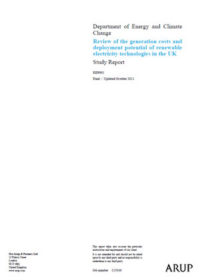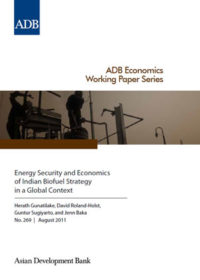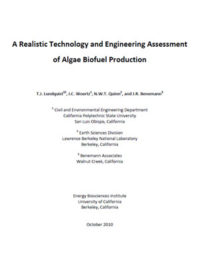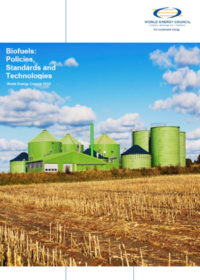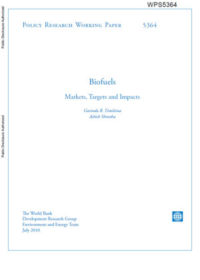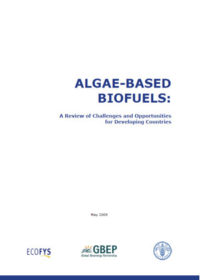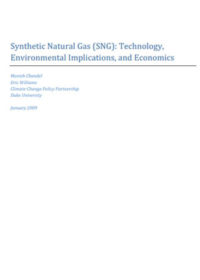Resources
Publications
Our publications, reports and research library hosts over 500 specialist reports and research papers on all topics associated with CCS.
View our Publication Library Disclaimer.
Filter by
Review of the generation costs and deployment potential of renewable electricity technologies in the UK
1st October 2011
Topic(s): Biofuels / Bioenergy, Economics, Fuel switching, Geothermal energy, Hydroelectricity, Marine energy, Renewables, Solar energy, Wind energy
Arup was appointed by the United Kingdom’s Department of Energy and Climate Change (DECC) in October 2010 to look at the deployment potential and generation costs of renewable electricity technologies in the UK up to 2030, taking into account sensitivities as to the range of cost inputs, investor behaviour and barriers to deployment. Arup was supported on cost data gathering exercises for some technologies by Ernst and Young (E&Y).
Disclaimer
The content within the Global CCS Institute Publications, Reports and Research Library is provided for information purposes only. We make every effort and take reasonable care to keep the content of this section up-to-date and error-free. However, we make no claim as to its accuracy, currency or reliability.
Content and material featured within this section of our website includes reports and research published by third parties. The content and material may include opinions and recommendations of third parties that do not reflect those held by the Global CCS Institute.
Energy security and economics of Indian Biofuel Strategy in a global context
1st August 2011
Topic(s): Biofuels / Bioenergy, Economics, Policy law and regulation, Renewables
This paper - part of the ADB Economics Working Paper Series - examines India’s options for managing energy price risk in three ways: biofuel development, energy efficiency promotion, and food productivity improvements. The overall results suggest that biodiesel shows promise as a transport fuel substitute that can be produced in ways that fully utilize marginal agricultural resources and hence promote rural livelihoods. First-generation bioethanol, by contrast, appears to have a limited ability to offset the impacts of oil price hikes. Combining the biodiesel expansion policy with energy efficiency improvements and food productivity increases proved to be a more effective strategy to enhance both energy and food security, help mitigate climate change, and cushion the economy against oil price shocks.
Disclaimer
The content within the Global CCS Institute Publications, Reports and Research Library is provided for information purposes only. We make every effort and take reasonable care to keep the content of this section up-to-date and error-free. However, we make no claim as to its accuracy, currency or reliability.
Content and material featured within this section of our website includes reports and research published by third parties. The content and material may include opinions and recommendations of third parties that do not reflect those held by the Global CCS Institute.
U.S. billion-ton update: biomass supply for a bioenergy and bioproducts industry
1st August 2011
Topic(s): Biofuels / Bioenergy, Economics, Renewables
U.S. Billion-Ton Update updates and builds on a 2005 US government biomass study. This report provides a spatial, county-by-county inventory of primary feedstocks, price and available quantities, and modelling of resource sustainability.
Disclaimer
The content within the Global CCS Institute Publications, Reports and Research Library is provided for information purposes only. We make every effort and take reasonable care to keep the content of this section up-to-date and error-free. However, we make no claim as to its accuracy, currency or reliability.
Content and material featured within this section of our website includes reports and research published by third parties. The content and material may include opinions and recommendations of third parties that do not reflect those held by the Global CCS Institute.
A realistic technology and engineering assessment of algae biofuel production
1st October 2010
Topic(s): Biofuels / Bioenergy, Engineering and project delivery, Renewables
This Energy Biosciences Institute report assesses the economics of microalgae biofuels production through an analysis of five production scenarios. These scenarios, or cases, are based on technologies that currently exist or are expected to become available in the near-term, including raceway ponds for microalgae cultivation, bioflocculation for algae harvesting, and hexane for extraction of algae oil. Process flow diagrams, facility site layouts, and estimates for the capital and operations costs of each case were developed de novo. This report also reviews current and developing microalgae biofuel technologies for both oil and biogas production, provides an initial assessment of the US and California resource potential for microalgae biofuels, and recommends specific R&D efforts to advance the feasibility of large-scale algae biofuel production.
Disclaimer
The content within the Global CCS Institute Publications, Reports and Research Library is provided for information purposes only. We make every effort and take reasonable care to keep the content of this section up-to-date and error-free. However, we make no claim as to its accuracy, currency or reliability.
Content and material featured within this section of our website includes reports and research published by third parties. The content and material may include opinions and recommendations of third parties that do not reflect those held by the Global CCS Institute.
Biofuels: policies, standards and technologies
1st September 2010
Topic(s): Biofuels / Bioenergy, Engineering and project delivery, Policy law and regulation, Renewables
This World Energy Council report reviews the biofuels debate within the arena of an increasing global appetite for energy. The report presents a global picture but focuses on the Americas. Discussion covers issues related to the diversity of energy supply, standardisation of biofuels, trade policies, sustainability of biofuels production and use and other topical matters with the ultimate objective of promoting a better understanding of the basic fundamentals which will define the future of biofuels worldwide.
Disclaimer
The content within the Global CCS Institute Publications, Reports and Research Library is provided for information purposes only. We make every effort and take reasonable care to keep the content of this section up-to-date and error-free. However, we make no claim as to its accuracy, currency or reliability.
Content and material featured within this section of our website includes reports and research published by third parties. The content and material may include opinions and recommendations of third parties that do not reflect those held by the Global CCS Institute.
Biofuels: markets, targets and impacts
1st July 2010
Topic(s): Biofuels / Bioenergy, Economics, Renewables
This paper reviews developments in biofuel markets and their economic, social and environmental impacts. In terms of climate change mitigation impacts, there exists a consensus that current biofuels lead to greenhouse gas mitigation only when greenhouse gas emissions related to land-use change are not counted. If conversion of carbon rich forest land to crop land is not avoided, the resulting greenhouse gas release would mean that biofuels would not reduce cumulative greenhouse gas emissions until several years had passed. Overall, results from most of the existing literature do not favor diversion of food for large-scale production of biofuels, although regulated production of biofuels in countries with surplus land and a strong biofuel industry are not ruled out. Developments in second generation biofuels offer some hope, yet they still compete with food supply through land use and are currently constrained by a number of technical and economic barriers.
Disclaimer
The content within the Global CCS Institute Publications, Reports and Research Library is provided for information purposes only. We make every effort and take reasonable care to keep the content of this section up-to-date and error-free. However, we make no claim as to its accuracy, currency or reliability.
Content and material featured within this section of our website includes reports and research published by third parties. The content and material may include opinions and recommendations of third parties that do not reflect those held by the Global CCS Institute.
Algae-based biofuels: a review of challenges and opportunities for developing countries
1st May 2009
Topic(s): Biofuels / Bioenergy, Renewables
Food and Agriculture Organization of the United Nations prepared this paper on algae-based biofuels in 2009 as a reference platform for possible future work of the Organization. The lead author of the paper was Sjors van Iersel from Ecofys.
Some of the main characteristics which set algae apart from other biomass sources are that algae (can) have a high biomass yield per unit of light and area, can have a high oil or starch content, do not require agricultural land, fresh water is not essential and nutrients can be supplied by wastewater and CO2 by combustion gas.
Disclaimer
The content within the Global CCS Institute Publications, Reports and Research Library is provided for information purposes only. We make every effort and take reasonable care to keep the content of this section up-to-date and error-free. However, we make no claim as to its accuracy, currency or reliability.
Content and material featured within this section of our website includes reports and research published by third parties. The content and material may include opinions and recommendations of third parties that do not reflect those held by the Global CCS Institute.
Synthetic natural gas (SNG): technology, environmental implications, and economics
1st January 2009
Topic(s): Biofuels / Bioenergy, Fuel switching, Renewables
Natural gas that can be produced from coal or biomass is known as ’synthetic natural gas’ or ’substitute natural gas’ (SNG). This Duke University paper examines the different technologies for SNG generation, the cost, and the environmental impacts of SNG. The paper identifies the conditions under which SNG production could be economically viable.
Disclaimer
The content within the Global CCS Institute Publications, Reports and Research Library is provided for information purposes only. We make every effort and take reasonable care to keep the content of this section up-to-date and error-free. However, we make no claim as to its accuracy, currency or reliability.
Content and material featured within this section of our website includes reports and research published by third parties. The content and material may include opinions and recommendations of third parties that do not reflect those held by the Global CCS Institute.
